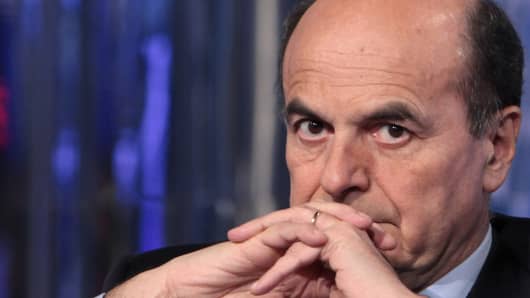Former Prime Minister Romano Prodi withdrew from the race for the Italian presidency on Friday, deepening the chaos in the centre-left after party rebels helped his old enemy Silvio Berlusconi scupper his candidacy.
The collapse of efforts by the centre-left to secure the presidency for Prodi underlines the deep fractures running through politics in a country still seeking a government nearly two months after February's inconclusive general election.
Italian centre-left leader Pier Luigi Bersani told his Democratic Party on Friday he would resign as soon as a new head of state is elected, Italian news agencies reported.
"Prodi's candidacy no longer exists," centre-left politician Matteo Renzi, by far the most popular centre-left politician, told reporters in Florence where he is mayor.
Bersani's center-left party backed Prodi for president on Friday morning, even though the leader of the center-right bloc, Silvio Berlusconi, has threatened to force new elections if Prodi becomes president.
Cracks appeared in the center-left Democratic Party (PD), the largest group in the lower house of parliament on Thursday, when Bersani's preferred presidential candidate, Franco Marini, failed to achieve a two-thirds majority in Thursday's votes because rebels from within the PD refused to back him.
Marini's defeat forced Bersani to meet his party on Friday morning to find a replacement candidate that his party members would support.
Choosing Romano Prodi as the PD party's candidate is a controversial move for Bersani, who had previously agreed with Berlusoni to support Marini, a rare show of consensus between the two blocs.
Berlusconi's party immediately rejected Prodi as a potential president on Friday, saying it was likely to prevent any government being formed and lead to early elections, Reuters reported.
"The PD's backing for a Prodi presidency has incensed Berlusconi's party and has emboldened him to push for early elections," Nick Spiro, head of Spiro Sovereign Strategy, told CNBC.
"Much now hinges on whether the PD can pick up a sufficient number of votes from Grillo's party, as Monti's centrists are unlikely to vote for Prodi. Yet even if Prodi is elected President, the likelihood of another election later this year or early next remains very high, irrespective of whether this is preceded by another technocrat-type government," Spiro added.
Although the president is mainly a symbolic figure and true power rests with the prime minister, he or she gives political leaders a mandate to govern. The president's role has become more prominent after elections in February failed to give any of the major political parties an outright majority.
(Read More: Only 'Insane Person' Would Want to Run Italy: Bersani)
Other parties such as the anti-establishment "Five Star Movement" had also rejected Marini's candidature, but Bersani's center-left had struck a deal with Silvio Berlusconi's center-right bloc on supporting Marini, event though Romano Prodi had been Bersani's first choice.
The move had fueled hopes that finding a successor to Giorgio Napolitano, whose mandate expires in May, would be straight forward.
(Read More: Can 10 'Wise Men' Really Save Italy?)
"Despite seeming agreement between Bersani's center-left and Berlusconi's center-right parties on Franco Marini as their preferred candidate for Italian President, the Italian parliament failed to vote in favor of the 80-year old," Tobias Blattner and Emily Nicol from Daiwa Capital Markets wrote in a note on Thursday.
"Divisions within the center-left alliance were responsible for the shortfall in votes for Marini, who garnered 520 votes, well below the 672 required. And with Bersani's party reportedly considering casting blank ballots in the second vote, the elections are likely to continue tomorrow, and if necessary over the weekend," Blattner and Nicol noted.
"[Thursday's] events highlight the continued and deep divisions among and within Italy's major parties, raising the risks of a new general election in the summer or autumn," they added.
(Read More: The Euro Zone Crisis Is Back)
To win the presidential vote, candidates need to gain a two-third majority out of 1,007 electors from the combined houses of parliament. If that cannot be reached in the third round of voting, a further round will be held in which only a simple majority is required.
Italy's presidential elections are the biggest indication of whether the country will have to return to the polls later this year, as a failure to agree over the next president could cement the political deadlock further.
Reuters contributed to this report.



